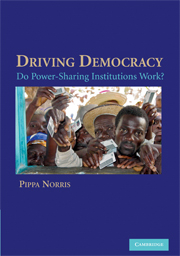Book contents
- Frontmatter
- Contents
- List of Tables
- List of Figures
- Preface and Acknowledgments
- PART I DO POWER-SHARING REGIMES WORK?
- 1 What Drives Democracy?
- 2 Evidence and Methods
- 3 Democratic Indicators and Trends
- 4 Wealth and Democracy
- PART II THE IMPACT OF POWER-SHARING INSTITUTIONS
- PART III CONCLUSIONS
- Technical Appendix: Description of the Variables and Data Sources
- Notes
- Select Bibliography
- Index
4 - Wealth and Democracy
Published online by Cambridge University Press: 05 September 2012
- Frontmatter
- Contents
- List of Tables
- List of Figures
- Preface and Acknowledgments
- PART I DO POWER-SHARING REGIMES WORK?
- 1 What Drives Democracy?
- 2 Evidence and Methods
- 3 Democratic Indicators and Trends
- 4 Wealth and Democracy
- PART II THE IMPACT OF POWER-SHARING INSTITUTIONS
- PART III CONCLUSIONS
- Technical Appendix: Description of the Variables and Data Sources
- Notes
- Select Bibliography
- Index
Summary
Can formal democratic institutions succeed if they are built in societies with inhospitable social and economic conditions? In particular, will attempts to hold competitive elections fail to strengthen democracy in poor and divided nation-states, as well as in regions such as the Middle East which are dominated by autocracy? Skeptics point to an earlier wave of institution building, when European-style parliaments were transplanted to many African societies during the era of decolonization, including in Benin and Togo, only to collapse as the military usurped their powers. We first need to establish the influence of certain underlying economic and social conditions on democratic consolidation before proceeding to examine the impact of power-sharing institutions in subsequent chapters. As Dahl points out, where the underlying conditions are highly unfavorable, then it is improbable that democracy could be preserved by any constitutional design. By contrast, if the underlying conditions are highly favorable, then democratic consolidation is likely with almost any constitution. But many cases fall into the muddy middle ground. The analysis of cross-sectional time-series data illuminates the general patterns and which conditions count, focusing upon examining the role of wealth, the size of nation-states, colonial legacies, regional diffusion, and the degree of ethnic heterogeneity. All of these factors can be regarded as ‘structural’ constraints on political development, meaning that it is difficult for domestic policymakers or the international community to alter these conditions in the medium to short term, if at all; for example, countries cannot change their histories or choose their neighboring states, although they can attempt to grow their economy.
- Type
- Chapter
- Information
- Driving DemocracyDo Power-Sharing Institutions Work?, pp. 79 - 100Publisher: Cambridge University PressPrint publication year: 2008



